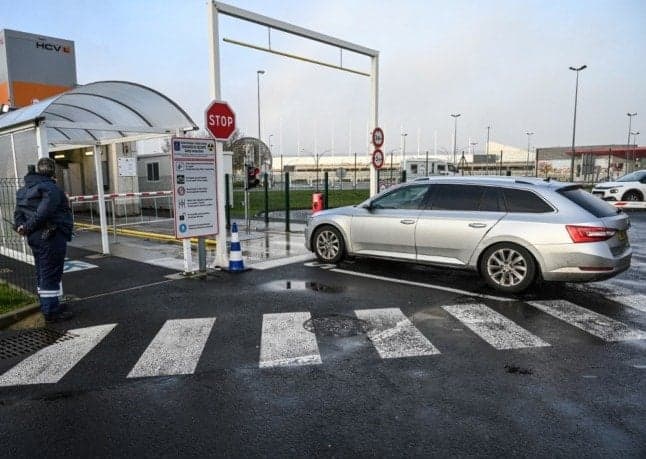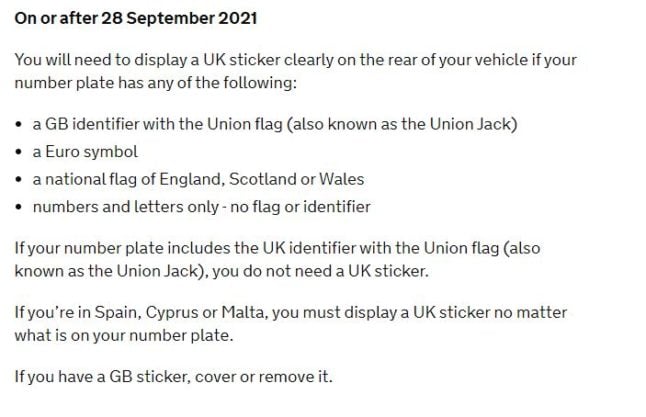UK introduces a new car sticker requirement for driving in Germany

There have been a lot of big changes in travel between Germany and the UK since the end of the Brexit transition period, but now the UK has introduced another - a new sticker requirement for British drivers.
If you intend to drive your British vehicle in Germany - or anywhere else in the EU - you will now need a "UK" sticker on your car.
This replaces the GB sticker or magnet that was previously needed when driving abroad, and the UK government guidance states: "If you have a GB sticker, cover or remove it."
The new rule will come into effect on September 28th, 2021 for British registered cars driving in the EU, with the exception of Ireland, which does not require a sticker or magnet.
SEE ALSO: Candidate barred from standing in German local election challenges removal of Brits’ EU rights
The UK government specifies: "You will need to display a UK sticker clearly on the rear of your vehicle if your number plate has any of the following:
- a GB identifier with the Union flag (also known as the Union Jack)
- a Euro symbol
- a national flag of England, Scotland or Wales
- numbers and letters only - no flag or identifier
"If your number plate includes the UK identifier with the Union flag (also known as the Union Jack), you do not need a UK sticker.
"If you’re in Spain, Cyprus or Malta, you must display a UK sticker no matter what is on your number plate."

A screenshot of the UK government's webpage on number plates.
The British government has also registered UK - rather than GB - as its new international symbol for traffic.
The UN said it had received “a notification stating that the United Kingdom is changing the distinguishing sign that it had previously selected for display in international traffic on vehicles registered in the United Kingdom, from ‘GB’ to ‘UK’”.
A spokesman for the British Department for Transport said: “Changing the national identifier from GB to UK symbolises our unity as a nation and is part of a wider move towards using the UK signifier across government.
“GB number plates will still be valid within the EU as long as drivers display a UK sticker on the rear of their vehicle.”
The difference between Great Britain and the UK is the inclusion of Northern Ireland - GB refers only to England, Scotland and Wales while UK is England, Scotland, Wales and Northern Ireland.
The new UK stickers will be available online, and in post offices and garages for around £1.50 (€1.75).
Clearly displaying the country of origin of your vehicle is an international requirement and if you are stopped by German police without one you can be issued with an on-the-spot fine (although it's unclear how bothered German police will be about the intricacies of UK v GB).
Drivers coming to Germany from the UK also need to remember that German law states that all motorists must carry with them an emergency triangle and a high-vis flourescent vest.
Other changes
While most people are unlikely to be losing much sleep over a sticker, there are some other bigger changes that Brexit has ushered in.
Driving to Germany does not require any extra paperwork, motorists who are only visiting can continue to drive on their UK licence and the insurance Green Card is no longer required.
You must, however, make sure that your UK passport has at least six months left to run.
Pets can no longer use the European Pet Passport and instead need an Animal Health Certificate, which must be renewed before each trip.
Meanwhile UK nationals who are resident in Germany need to show their visa or residency card along with their passport every time they enter or leave the country, to avoid having their passport stamped as a visitor.
Also bear in mind restrictions on what can be brought in to the EU from the UK, which includes high-value items, food and plants.
Comments (5)
See Also
If you intend to drive your British vehicle in Germany - or anywhere else in the EU - you will now need a "UK" sticker on your car.
This replaces the GB sticker or magnet that was previously needed when driving abroad, and the UK government guidance states: "If you have a GB sticker, cover or remove it."
The new rule will come into effect on September 28th, 2021 for British registered cars driving in the EU, with the exception of Ireland, which does not require a sticker or magnet.
SEE ALSO: Candidate barred from standing in German local election challenges removal of Brits’ EU rights
The UK government specifies: "You will need to display a UK sticker clearly on the rear of your vehicle if your number plate has any of the following:
- a GB identifier with the Union flag (also known as the Union Jack)
- a Euro symbol
- a national flag of England, Scotland or Wales
- numbers and letters only - no flag or identifier
"If your number plate includes the UK identifier with the Union flag (also known as the Union Jack), you do not need a UK sticker.
"If you’re in Spain, Cyprus or Malta, you must display a UK sticker no matter what is on your number plate."

A screenshot of the UK government's webpage on number plates.
The British government has also registered UK - rather than GB - as its new international symbol for traffic.
The UN said it had received “a notification stating that the United Kingdom is changing the distinguishing sign that it had previously selected for display in international traffic on vehicles registered in the United Kingdom, from ‘GB’ to ‘UK’”.
A spokesman for the British Department for Transport said: “Changing the national identifier from GB to UK symbolises our unity as a nation and is part of a wider move towards using the UK signifier across government.
“GB number plates will still be valid within the EU as long as drivers display a UK sticker on the rear of their vehicle.”
The difference between Great Britain and the UK is the inclusion of Northern Ireland - GB refers only to England, Scotland and Wales while UK is England, Scotland, Wales and Northern Ireland.
The new UK stickers will be available online, and in post offices and garages for around £1.50 (€1.75).
Clearly displaying the country of origin of your vehicle is an international requirement and if you are stopped by German police without one you can be issued with an on-the-spot fine (although it's unclear how bothered German police will be about the intricacies of UK v GB).
Drivers coming to Germany from the UK also need to remember that German law states that all motorists must carry with them an emergency triangle and a high-vis flourescent vest.
Other changes
While most people are unlikely to be losing much sleep over a sticker, there are some other bigger changes that Brexit has ushered in.
Driving to Germany does not require any extra paperwork, motorists who are only visiting can continue to drive on their UK licence and the insurance Green Card is no longer required.
You must, however, make sure that your UK passport has at least six months left to run.
Pets can no longer use the European Pet Passport and instead need an Animal Health Certificate, which must be renewed before each trip.
Meanwhile UK nationals who are resident in Germany need to show their visa or residency card along with their passport every time they enter or leave the country, to avoid having their passport stamped as a visitor.
Also bear in mind restrictions on what can be brought in to the EU from the UK, which includes high-value items, food and plants.
Join the conversation in our comments section below. Share your own views and experience and if you have a question or suggestion for our journalists then email us at [email protected].
Please keep comments civil, constructive and on topic – and make sure to read our terms of use before getting involved.
Please log in here to leave a comment.